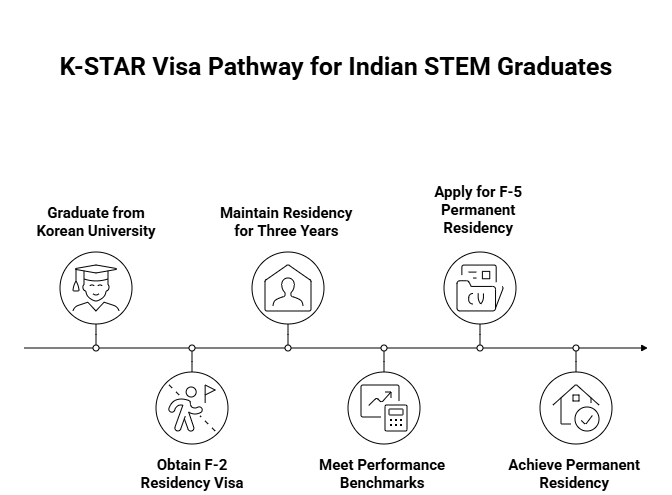Posted on October 13 2025
South Korea Introduces K-STAR Visa to Attract Global STEM Professionals. Apply now!
By , Editor
Updated November 15 2025
Highlights: South Korea Launches K-STAR Visa to Welcome Global STEM Talent by 2026
- South Korea has launched the K-STAR Visa Track to attract top international talent in science, technology, engineering, and mathematics (STEM).
- The visa will invite over 400 elite foreign professionals annually, focusing on fields like AI, biotechnology, and advanced engineering.
- It offers a streamlined route from F-2 residency to F-5 permanent residency and citizenship, promoting long-term settlement.
- The program will run in collaboration with top Korean universities, allowing direct recommendations for exceptional international graduates.
- After a successful pilot in 2023, full nationwide implementation of the K-STAR Visa is scheduled for 2026.
*Want to know more about the South Korea K-STAR visa? Sign up with Y-Axis for complete immigration assistance.
South Korea’s New Visa Revolutionizes Opportunities for STEM Talent
The Republic of Korea’s Ministry of Justice has introduced the K-STAR Visa to attract top-tier global scientists, researchers, and technology experts who can contribute to the country’s innovation ecosystem. The visa aims to boost South Korea’s global competitiveness by offering a seamless transition from temporary stay to permanent residency and citizenship for qualified candidates.
The program is being developed in partnership with leading Korean universities and research institutions. University presidents can directly recommend outstanding international graduates, particularly those completing Master’s or Ph.D. degrees in STEM fields for the K-STAR Visa track.
This visa simplifies entry, encourages long-term settlement, and ensures that high-skilled professionals can continue contributing to South Korea’s technological advancement without facing bureaucratic hurdles.
*Want to work in South Korea? Let Y-Axis guide you with the process.
How Indian STEM Graduates Can Benefit from South Korea’s K-STAR Visa
For Indian students and professionals in STEM fields, South Korea’s newly launched K-STAR Visa presents a ground-breaking opportunity to build a long-term career in one of Asia’s fastest-growing innovation economies. Designed to attract global talent in science, technology, engineering, and mathematics, the visa provides a clear path from education to permanent residency, and ultimately, citizenship.
Under this initiative, graduates from approved Korean universities can directly transition to an F-2 residency visa immediately after completing their master’s or doctoral degrees, even without a job offer. After maintaining this status for three years, eligible candidates can apply for F-5 permanent residency, provided they meet performance and research benchmarks set by their institutions.
The program is being implemented in collaboration with leading Korean universities and research centres, allowing university presidents to recommend outstanding international graduates. This offers a simplified route for talented researchers and engineers to remain in Korea and contribute to its thriving technology sectors.
Key benefits for Indian professionals include:
- Direct F-2 residency after graduation — no employment offer required.
- Eligibility for permanent residency in just three years under the K-STAR track.
- Access to Korea’s top research institutions in cutting-edge fields like AI, biotechnology, and advanced engineering.
- Collaboration opportunities with globally recognized tech and innovation leaders.
Since the pilot launch in 2023, around 300 international professionals have already received F-2 residency through this visa route. The government aims to expand participation to more universities in 2025, with full nationwide rollout expected by 2026.
With South Korea emerging as a global leader in science and technology, the K-STAR Visa opens doors for Indian researchers, innovators, and technologists to join an ecosystem that values innovation, collaboration, and long-term settlement.

From Talent to Technology: How South Korea Plans to Lead Global Innovation
With the introduction of the K-STAR Visa, South Korea is taking a bold step toward redefining its position in the global talent landscape. The government’s focus isn’t just on attracting professionals, it’s on building an ecosystem that nurtures long-term innovation and collaboration.
The Ministry of Justice has confirmed that it will roll out special support channels and industry-university partnerships to help foreign experts integrate seamlessly into Korea’s high-tech sectors. This includes orientation programs, research collaboration networks, and feedback mechanisms to continuously improve the visa system.
By connecting global STEM talent with Korea’s growing technology industries, the K-STAR initiative aims to address skill shortages, enhance research capacity, and strengthen international cooperation. It reflects South Korea’s broader vision — to become a hub where the world’s brightest innovators can contribute to advancements in science, technology, and sustainability.
For Indian professionals aspiring to work abroad, this marks a powerful opportunity to be part of a nation that values talent, rewards expertise, and offers a clear route from research to residency.
*Are you looking for step-by-step assistance with overseas immigration? Contact Y-Axis, the world’s No. 1 overseas immigration consultancy!
For recent immigration updates, check out Y-Axis News Page!
FAQs
1. What is the South Korea K-STAR Visa?
The South Korea K-STAR Visa (Korea Science & Technology Advanced Human Resources) is a new visa program launched by the Ministry of Justice to attract top international talent in science, technology, engineering, and mathematics (STEM). It provides a streamlined pathway for foreign professionals, researchers, and graduates to live and work in South Korea. The visa allows eligible candidates to move from temporary residence to permanent residency and eventually citizenship, helping South Korea strengthen its position as a global innovation hub in advanced technologies such as AI, biotechnology, and engineering.
2. Who is eligible to apply for the K-STAR Visa in South Korea?
The K-STAR Visa is open to international students, researchers, and professionals in STEM fields who have completed or are pursuing advanced degrees in South Korea. Applicants must graduate from designated Korean universities offering eligible STEM programs and be recommended by their university president based on academic performance and research excellence. The program prioritizes top-tier global talent, particularly those holding master’s, doctoral, or postdoctoral qualifications. The goal is to retain outstanding foreign graduates in Korea’s research and innovation sectors and provide them with long-term settlement opportunities.
3. What fields or sectors does the K-STAR Visa target?
The K-STAR Visa focuses on professionals and researchers in high-demand science and technology sectors driving South Korea’s innovation agenda. It primarily targets experts in artificial intelligence (AI), biotechnology, robotics, data science, and advanced engineering. These fields have been identified as critical to South Korea’s economic growth and global competitiveness. The program aims to attract leading scientists, technologists, and innovators capable of contributing to cutting-edge research, technological advancement, and sustainable development across Korea’s universities, research centers, and emerging industries.
4. What are the main benefits of the K-STAR Visa for foreign professionals?
The K-STAR Visa offers several advantages to international professionals and graduates. Eligible candidates can obtain F-2 residency status immediately after graduation, even without an employment offer. After three years of continuous residence and satisfactory performance, they may apply for F-5 permanent residency, which can later lead to citizenship. The visa also provides access to Korea’s world-class research facilities, innovation networks, and collaboration opportunities with global technology leaders. It is designed to support long-term settlement and integration, making South Korea a preferred destination for skilled professionals and researchers.
5. How does the K-STAR Visa differ from South Korea’s existing work visas?
Unlike South Korea’s existing work visas, which are typically tied to employer sponsorship or specific job roles, the K-STAR Visa is education and research-based. It enables graduates and professionals to gain residency without requiring a job offer or company endorsement. The program focuses on individual merit, academic excellence, and contribution to scientific advancement rather than employment status. Moreover, it provides a faster route to permanent residency—within three years—compared to the longer timelines of other visa categories. It reflects South Korea’s shift toward innovation-led immigration policies.
6. What is the application process for the K-STAR Visa?
The K-STAR Visa application process begins with participating universities applying to join the program. Once approved, these universities can recommend outstanding international STEM graduates for the visa. Eligible candidates are then allowed to transition from their current student or research visa to F-2 residency status. Applications will be assessed based on academic achievements, research performance, and recommendations. Every three years, the visa holders undergo a performance review, and after successful completion, they can apply for F-5 permanent residency. The full implementation of the process is expected by 2026.
7. Can K-STAR Visa holders bring their family members to South Korea?
Although detailed family policies for the K-STAR Visa are yet to be officially published, it is expected that visa holders under F-2 residency will be able to sponsor dependents. Typically, South Korea’s F-series visa holders can bring their spouse and children under family reunification provisions. Once confirmed, this policy would allow K-STAR Visa holders to live with their families while pursuing long-term research or professional careers. Further guidelines from the Ministry of Justice will clarify specific requirements and benefits for dependents once the visa becomes fully operational.
8. How long is the K-STAR Visa valid, and can it be extended?
The K-STAR Visa initially grants holders F-2 residency status, generally valid for up to three years. This status can be renewed based on the visa holder’s academic or research performance and continued engagement with Korean institutions. After maintaining F-2 status for three years and meeting all requirements, visa holders can apply for F-5 permanent residency. This progression provides a clear path from temporary residence to permanent settlement. The performance-based renewal ensures that only active, contributing professionals benefit from the program’s long-term advantages.
9. Which countries’ professionals are eligible for the K-STAR Visa program?
The K-STAR Visa program is open to international professionals from all countries, without nationality restrictions. It welcomes highly skilled scientists, engineers, and researchers from around the world who meet the academic and research criteria set by the South Korean government. This global approach allows professionals from India and other nations to pursue education, research, and residency opportunities in Korea’s advanced technology sectors. The inclusive policy reinforces South Korea’s goal to attract the best global minds to strengthen its innovation-driven economy.
10. When will the K-STAR Visa officially be available for applications?
The K-STAR Visa is currently in its pilot phase and will be fully implemented by 2026. Since its early rollout in 2023, around 300 professionals have already received residency through the system. In 2025, the Ministry of Justice will expand the program to more universities across South Korea. Once this process is complete, eligible students and professionals can begin applying through approved institutions. The phased approach ensures that universities and immigration authorities are prepared for a smooth, efficient application and evaluation process.
Tags:
South Korea K-STAR Visa
South Korea K-STAR visa
K-STAR visa in South Korea
Work abroad
overseas immigration news
South Korea immigration
Migrate to South Korea
work in South Korea
Tech jobs in Korea
STEM professionals in South Korea
K-STAR visa
Share
Options for you by Y-Axis
Get it on your mobile
Get News alerts
Contact Y-Axis

